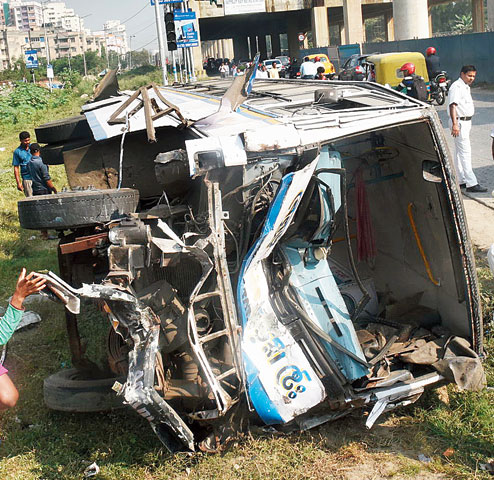
Picture by Sanjoy Chattopadhyaya
Calcutta: A 48-year-old man whose heart had stopped beating for 25 minutes after suffering a cardiac arrest in the middle of his first road race is back home safe and aiming to lace up his running shoes again.
When Shyam Sundar Sonika was being discharged from Fortis Hospital last Friday, the first thing he wanted to know was when he could resume running. "I am alive because of the skill of the doctors who treated me. I have requested them to tell me when I can hit the road again with my running shoes," said the father of two.
Sonika, a stockbroker, remembers "feeling fine" when the finish mat of the Open 10K Run at the Tata Steel Kolkata 25K, partnered by The Telegraph, came into view. Then he blanked out.
"We were almost on the verge of giving up after 25 minutes when he moved his hand and his heart started to pump (blood) again," recounted Sanjukta Dutta, head of emergency medicine at Fortis.
Dutta was leading a 100-strong medical team from Fortis Hospital that was deployed across the race route. "We put him on bag mask ventilation and started CPR (cardiopulmonary resuscitation). He was incubated so that oxygen directly reached his lungs. We also gave him the standard DC shock twice to revive the pumping activity of his heart," she said.
Sonika did not wake up until the next day, when doctors removed a tube that had been aiding his breathing. In the intervening hours, the medical team and intensive care set-up at the venue were put to the test.
According to the organisers of the race, CCTV footage confirms that a stretcher reached Sonika within 40 seconds of him collapsing. Bleeding from the mouth, he was moved to the medical base camp that had 14 beds, including two with a ventilator each. He did not have a pulse.
Many people at the race had seen Sonika staggering before he collapsed about seven metres from the finish. He fell face first, resulting in a broken rib and a chin cut that required four stitches.
Doctors recommend that people with discomfort in the chest or shortness of breath must consult a doctor and get an echocardiogram done or take a treadmill test before they take up running. The thumb rule in running is to keep the body hydrated and stop and ask for medical help if anyone feels unwell.
A study involving 11 million long-distance runners in the US over 10 years reported 59 instances of cardiac arrest in the middle of a race or practice. Around 70 per cent of these people could not be revived. The study does not say how many of the remaining 30 per cent suffered brain damage, a common outcome of prolonged CPR.
For Sonika, December 17 was a journey to the jaws of death and back, but his heart is still in running. "We are awaiting the results of some tests. Once the results come, it will become clear if he can resume running straightaway or after a corrective surgery," Dutta said.










